Iranian Workers' Protests Surge Amid Economic Strife
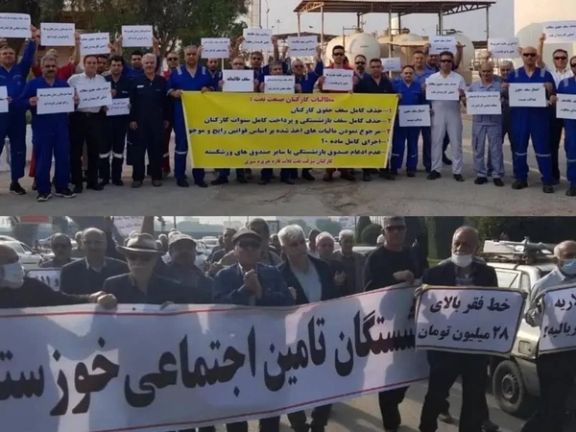
Ongoing labor rights and economic demands have ignited further protests in various sectors across Iran, including retirees and oil and gas employees.

Ongoing labor rights and economic demands have ignited further protests in various sectors across Iran, including retirees and oil and gas employees.
Employees of a petroleum company, affiliated with Iran's Offshore Oil Company in Hormozgan province, gathered once again to voice their dissatisfaction and protest the neglect of their demands.
Likewise, official and contractual employees of the Ministry of Oil, employed at the Aghajari Oil and Gas Exploitation Company, resumed protests against the disregard for their demands including the complete removal of salary caps, elimination of retirement age restrictions, and reimbursement of excess tax deductions.
Prior to this, Iranian oil industry employees had staged strikes, advocating for salary and wage increases to address economic concerns.
In a separate development, workers from the terminals and petrochemical reservoirs in Bandar Mahshahr held a demonstration outside their company's building, protesting the lack of attention to their demands.
Simultaneously, after eight consecutive days of strikes, employees of the Iranian National Steel Industrial Group declared their intention to prolong the strike until their demands, including salary and wage increases, are met.
The trend continued with retirees from the Social Security of Ahvaz and Shush expressing dissatisfaction with poor living conditions and unmet demands, rallying in front of the Social Security Organization and the Governorate building.
Retirees from the steel industry in Mazandaran and Esfahan also gathered in front of the Pension Fund, emphasizing their grievances.
In 2023 alone, Iran has witnessed at least 320 labor-related gatherings and 111 labor strikes, with the majority of protests centered around demands for improved wages and working conditions.
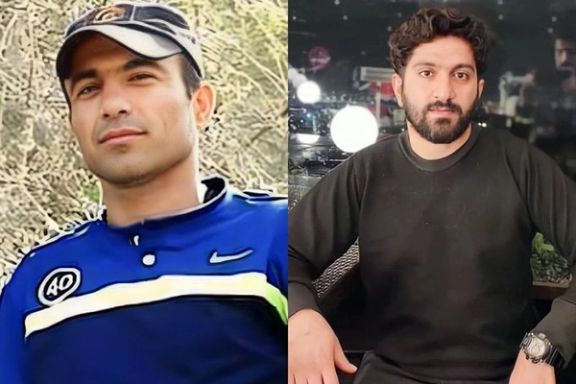
Reza Rasaei and Mojahed Kourkour, protesters sentenced to death, have been dispatched for execution.
Azardokht Haqjouyan, Reza Rasaei's mother, asserted her son's innocence and pleaded for assistance to prevent the execution of his death sentence. She revealed that her son's extensive 1,500-page case file had been reviewed within a week.
Rasaei faces accusations of "murder" in connection with the death of Nader Beirami, the head of intelligence in Sanandaj, during a protest in the city on November 17, 2022.
Mojahed Kourkour's sister confirmed on December 24 that her brother's death sentence had been ratified in the 39th branch of the Supreme Court.
Kourkour is among the detainees of the nationwide uprising in Izeh, arrested on December 20, 2022 during an armed attack by security and law enforcement forces on a village near Izeh.
The judiciary identifies him as the "main suspect" in the killing of 10-year-old Kian Pirfalak, but Kian's family steadfastly maintains that the perpetrators were government forces. The situation has raised international concern over the due process and human rights in Iran.
In the latest annual report, Human Rights Activists In Iran (HRANA) claimed the execution of 746 individuals, noting a 32 percent increase of executions from 2022 and death sentences issued rising by 68 percent.
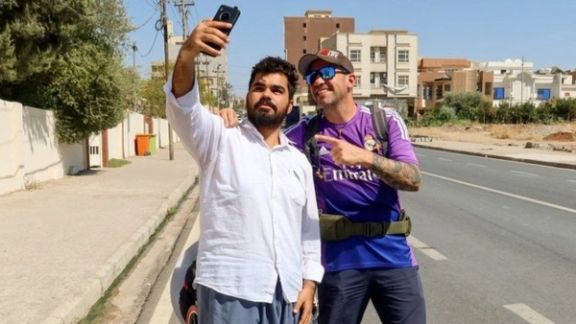
Iran’s embassy in Spain confirmed the release of Santiago Sánchez, a Spanish football fan held on espionage charges during his trip from Madrid to Qatar's World Cup.
Sánchez had been detained in Tehran amidst an extensive Middle East tour on his way to Qatar but is understood to have been arrested after visiting the grave of Mahsa Amini, the symbol of the 2022 uprising who died in morality police custody.
Before his unexplained disappearance in October 2022, Sánchez, a former paratrooper and devoted Real Madrid supporter, documented each leg of his extensive journey on social media. Starting his expedition in January 2022, he traversed Europe, Turkey, and Iraq before facing over a year of detention in Iran.
“The embassy of the Islamic Republic of Iran is pleased to announce the release of Santiago Sanchez Cogedor, the only Spanish citizen detained in Iran,” the Iranian Embassy in Spain posted on social media. “His release comes amid friendly and historic relations between the two countries and in accordance with the law.”
Tehran is known to be holding over 10 Western nationals, with accusations from governments and NGOs suggesting that Iran is employing them as leverage in negotiations involving its own citizens.
The release was a "humane and legal" step, Iran's Foreign Ministry spokesperson said on Monday, without giving further details.

Iranian women's national soccer team player, and Emory University team member Melika Mohammadi, tragically died in a car accident last week, while visiting Iran.
On Sunday, she was commemorated at Tehran's Azadi Stadium before her repatriation to the United States for burial.
Born in the southern Iranians city of Shiraz in 2000, Mohammadi died on December 24 at the age of 23 in a car accident near the city of Bam in eastern Iran where she played for the city’s Khatoon FC, the winner of the 2022-2013 Iranian league title.
“Melika was also a women’s right activist and large empowering force to younger generations,” her teammates at Emory women’s soccer team for which she played for two years wrote on Instagram.
Female fans of Esteghlal FC honoring the memory of Mohammadi at a match in Tehran on December 30.
“She really wanted to empower other women in Iran and had plans for setting up several soccer schools in Iran with her own money to help other girls whose training opportunities are very limited,” a family member told Iran International.
The memorial during which Mohammadi’s flag-draped coffin was carried by military guards was attended by Mohammadi’s parents and other family members, friends, some sports officials, and several athletes.
Mohammadi’s sister, Aida who was wearing her sister’s number 18 national team shirt, and several others, ran a victory round at the stadium Sunday in her honor.
This was the first time such a ceremony was being held for a female athlete at Azadi Stadium. As a woman, Mohammadi had never practiced or played there due to an unwritten ban.
Women have not even been allowed to watch men’s matches at Azadi and other stadiums for four decades, except in a few rare cases, due to the ban. The world’s soccer authority (FIFA) has tried to convince the Islamic Republic for nearly a decade to lift the ban on women attending stadiums to watch male players. In recent months the ban has been relaxed somewhat.
Women’s matches are also never shown on TV.
Mohammadi’s coffin being carried at Azadi Stadium
Mohammadi started playing soccer from a very young age. She was invited to play for the national girls’ soccer team at the age of eleven and later to the under-17 team and the national women’s team.
Most recently, Mohammadi played as a midfielder for the national women’s soccer team. She played a pivotal role in her team in the 2022 AFC Women’s Asia Cup, the first ever win in the games for Iran's women’s team.
Since the age of 13, when she moved to the United States with her family, Mohammadi had also simultaneously played for Walt Whitman High School in Bethesda, Maryland as well as Emory University of Atlanta, Georgia, from where she received her Bachelor of Science in anthropology and human biology.
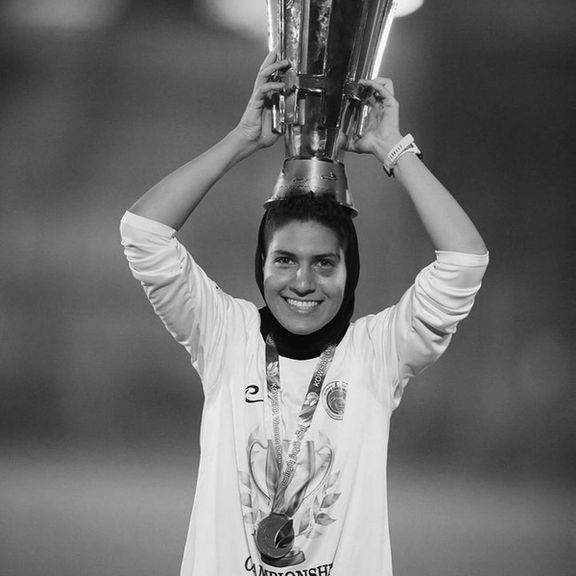
To be able to play for the national team in Iran and study in the US, she had to travel back and forth between Iran and the United States throughout these years.
Her mother said in a speech at the memorial ceremony at Hafezieh Stadium of Shiraz that her daughter decided to play in the Iranian league and the national team to help “shatter the glass ceiling” keeping Iranian women from success.
In the past few days Mohammadi has been remembered by fans with posters, silence, and chants at several matches.
Video posted by former national team coach, Maryam Irandoust, shows Melika and her teammates singing on a train during a tour.
“Iranian women who do not have a share of Azadi Stadium are only given their right of presence there after they die, ... Melika Mohammadi is truly commemorated only when women can freely be [allowed] presence at Azadi,” one of the tweets about the event read.
“Alas that Melika came to Azadi Stadium, for the first and last time, in these circumstances,” the very popular former TV football commentator and producer Adel Ferdosipour, who attended the ceremony at Azadi Stadium, told reporters referring to the unwritten ban on women’s team practicing and playing at the stadium like men’s team.
“Melika darling, you were the reason … Iranian female soccer players could go Azadi Stadium, a stadium where they had never trained there even once,” Hajar Dabbaghi, another national soccer team player wrote on Instagram while criticizing male soccer players for failing to show up at Melika’s remembrance.
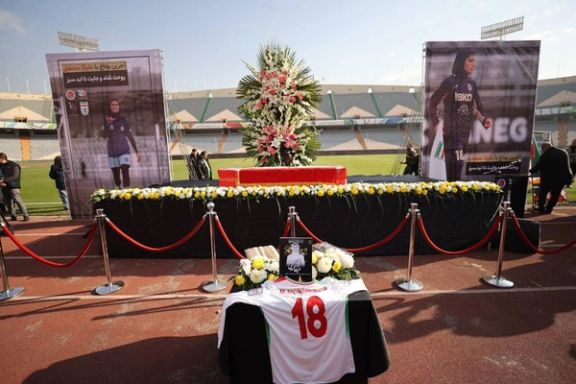
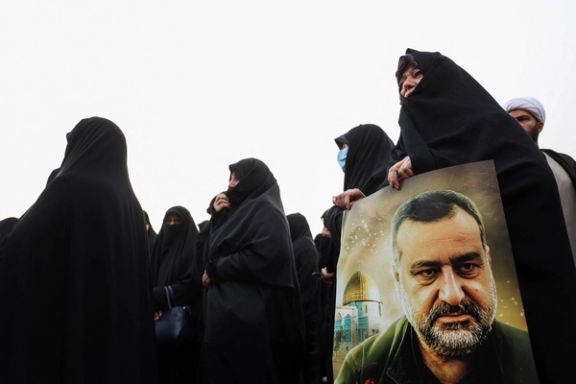
After Iran International exposed the inner circle of Iran’s top military man in Syria, eliminated by Israel this week, it is believed they will be Israel's next potential targets.
Israeli network i24 News reported on Sunday that following the killing of senior Iranian Revolutionary Guard general Razi Mousavi in an Israeli airstrike, his close aides may be next on Israel's hit list. The report by the Israeli website, which cited Iran International as the source of the information, was picked up by Iranian state media as “the four IRGC-Quds Force members on Israel’s kill list.”
Iran International’s Mojtaba Pourmohsen has exclusively reported on Iran’s network of arms smuggling into Syria via passenger planes and then to Lebanon and has identified several key members of the team. The operation was overseen by Razi Mousavi, prompting speculations that his deputies are going to run the operation after his death.
Abdollah Ebadi is Mousavi’s deputy who transfers weapons from Iran to Syria via commercial flights. His right hand, identified as Zein Shams Abu Adnan, is a key figure of the so-called ‘Relief Office’ of the operation – apparently a cover name for IRGC-Quds Force Unit 2250. Masoud Katbi is another deputy who used to head the transfers division and has been recently replaced by Hadi Feizabadi.
Unit 2250 is tasked with delivering all the cargo intended for Tehran's proxy forces in the port of Latakia, a target of repeated Israeli attacks. In December 2021, Israel hit containers of Iranian munitions being unloaded at the port.
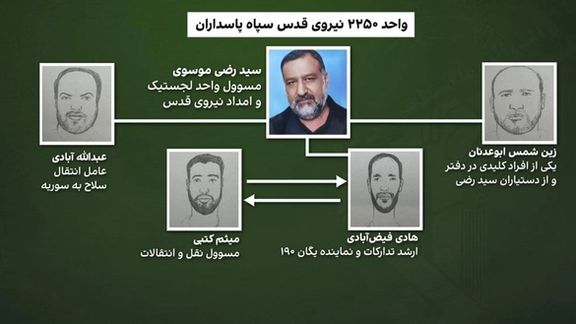
Israel has not officially claimed responsibility for the targeted killing, but it has always insisted that it seeks to prevent entrenchment of Iran-backed forces near its borders. It has been mounting attacks in Syria for years against Iranian and Iran-backed forces that have deployed there presumably to support Syrian President Bashar al-Assad.
However, Israeli Prime Minister Benjamin Netanyahu said Saturday that Israel “acts against Iran all the time, everywhere, in every way,” adding that Israel is “landing heavy blows against Hezbollah, eliminating many terrorists and destroying the enemy’s capabilities.”
“If Hezbollah expands the war, it will receive blows it never dreamed of – and so will Iran... Iran leads the axis of evil and aggression against us on the various fronts,” he stated.
In recent years, Israel has intensified strikes on Syrian airports to disrupt Tehran's increasing use of aerial supply lines to deliver arms to allies in Syria and Lebanon including Hezbollah. Following increasing disruptions to ground transfers, Tehran has adopted air transport as a more reliable means of ferrying military equipment to its proxy militias.
Since October 7, when Iran-backed Islamist group Hamas declared war on Israel, Tehran’s proxies have intensified attacks on US and Israeli targets across the region to pressure Israel into ceasing its retaliatory offensive in Gaza. Iran denies involvement in the October 7 attack but cheers Hamas killings and pledges unwavering support to any group that acts against Israel and US forces.
The death of Razi Mousavi on December 25 is seen as a blow to the Iranian regime’s ability to strengthen and supply its proxy forces in the region. Iran has vowed revenge for the targeted killing, similar to a US air strike that killed Iran’s Quds Force commander Qasem Soleimani in January 2020 in Baghdad.
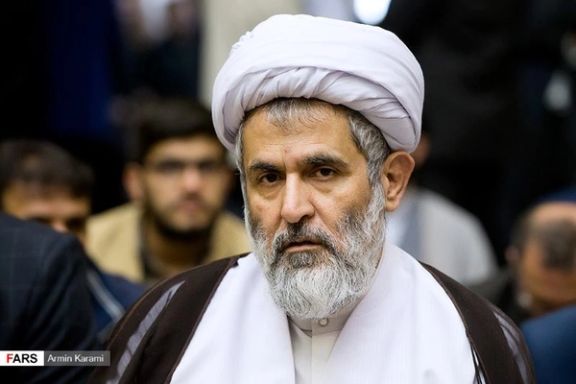
A former IRGC official claims that Razi Mousavi, who was recently killed in Syria, played a key role in direct confrontations with Israel.
Hossein Taeb, former head of the Islamic Revolutionary Guard Corps' (IRGC) Intelligence Organization, asserted on Sunday that Mousavi's death will intensify the resolve of the resistance movement against Israel.
Mousavi, reportedly targeted in an Israeli airstrike, is praised by the Iranian regime for his efforts in strengthening Iran's proxy forces of the "Axis of Resistance" in the region. The loss is deemed a setback for Iran, particularly in the context of the ongoing conflict between Israel and Hamas.
The advisor to the commander-in-chief of the Revolutionary Guards also vowed that such actions would not go unanswered.
In the midst of the ongoing Gaza war initiated by Hamas on October 7 against Israel, Iran-backed militias from Syria, Iraq, Yemen, and Lebanon have entered the conflict. Additionally, reports suggest that 11 senior officers of Iran's Revolutionary Guards fell victim to an Israeli airstrike on Damascus airport on Thursday.
Israel, traditionally reserved in commenting on such military operations, reiterates its commitment to preventing Iran's military entrenchment in Syria. Since 2017, Israel has consistently targeted Syrian locations to thwart Iran's attempts to bolster its military footprint and pose a threat to its northern borders. Notably, Syrian airports, allegedly facilitating the transportation of weapons to proxy forces by Iran, have become frequent targets.